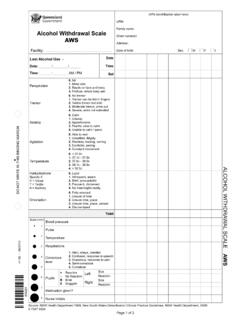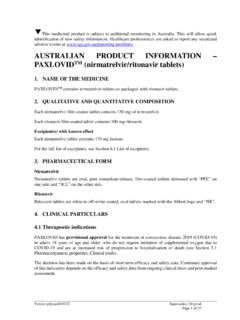Transcription of Alcohol and Drug Withdrawal Clinical Practice Guidelines
1 Queensland Alcohol and drug Withdrawal Clinical Practice GuidelinesQueensland HealthThese Guidelines are also available online at Health, Alcohol and Other Drugs DirectorateLevel 2, 15 Butterfield StreetHerston Qld 4006PO Box 2368 Fortitude Valley BC 4006 Main phone: 07 3328 9506 Main fax: 07 3328 9126 These Guidelines have been adapted from the drug and Alcohol Withdrawal Clinical Practice Guidelines NSW with the kind permission of the Mental Health and drug and Alcohol Office, new south wales Ministry of Guidelines have been developed to provide clinicians with a comprehensive manual that covers all aspects of Withdrawal management. The Guidelines are not intended to replace Clinical judgment in individual cases, but they will assist in managing patients safely and with all medical Practice , clinicians are encouraged to document decisions made with regard to Withdrawal management clearly in the patient s work is copyright.
2 It may be reproduced in whole or in part for study or training purposes subject to the inclusion of an acknowledgement of the source. It may not be reproduced for commercial usage or sale. Reproduction for purposes other than those indicated requires written permission from Queensland Health. Queensland HealthFor further copies of this document, please contact:Mental Health, Alcohol and Other Drugs DirectorateLevel 2, 15 Butterfield StreetHerston Qld 4006PO Box 2368 Fortitude Valley BC 4006 Main phone: 07 3328 9506 Main fax: 07 3328 9126 Further copies of this document can be downloaded from the Queensland Health website: August 2012 ISBN: 978-1-921707-83-4 Queensland Alcohol and drug Withdrawal Clinical Practice Guidelines1fifl 0. HeadlineQueensland Alcohol and drug Withdrawal Clinical Practice GuidelinesContents1.
3 Introduction .. Background .. Dependence, tolerance and Withdrawal .. ICD-10 definitions .. DSM-IV definitions ..52. General principles of Withdrawal management .. Rationale and underlying principles for Withdrawal management .. Presentation for Withdrawal management .. Elective presentations .. Crisis presentations .. Unplanned Withdrawal .. Information about Withdrawal service .. Assessment for Withdrawal management .. Primary aims of assessment .. Key elements in assessment .. Full consumption history .. Brief consumption history .. Street names and prices of drugs .. Consumption calculations .. Identifying risks associated with polydrug use .. Selective Withdrawal .. Identifying history of Withdrawal .. Assessing current Withdrawal status.
4 Physical examination for Withdrawal management .. Mental health assessment .. Screening for domestic violence .. Psychosocial assessment .. Child protection .. Formulating the management plan .. treatment -matching for Withdrawal management .. Special groups .. treatment agreements .. Treating Monitoring .. Pharmacological treatment .. Routine supportive care .. Managing difficult behaviour .. Driving .. HIV, hepatitis B and hepatitis C screening .. Continuing care .. Discharge planning ..263. Alcohol .. Use and effects of Assessment issues specific to Alcohol -dependent patients .. Unplanned Withdrawal .. Alcohol Withdrawal .. Onset and duration .. Signs and symptoms .. Monitoring .. Routine observations during Withdrawal .
5 Supportive care .. Medication .. Preventing dehydration .. Routine prevention of Wernicke s encephalopathy .. Ambulatory Withdrawal treatment .. Special issues .. Seizures .. Delirium tremens .. Management of Withdrawal with intercurrent illness .. Pregnancy .. Continuing care ..36 Queensland Alcohol and drug Withdrawal Clinical Practice Guidelines2fifl ContentsQueensland Alcohol and drug Withdrawal Clinical Practice Guidelines4. Benzodiazepines .. Use and effects of benzodiazepines .. Assessment issues specific to benzodiazepine-dependent patients .. Patterns of use .. Incidence of benzodiazepine Withdrawal .. Onset and duration of benzodiazepine Withdrawal .. Signs and symptoms of benzodiazepine Withdrawal .
6 Monitoring .. treatment setting for benzodiazepine Withdrawal .. Withdrawal management .. Unplanned Withdrawal .. Managing benzodiazepine Withdrawal in polydrug-dependent patients .. Pregnancy .. Continuing care ..445. Opioids .. Use and effects of opioid drugs .. Assessment issues specific to opioid -dependent patients .. Assessing opioid dependence .. Unplanned Withdrawal .. Onset and duration of Withdrawal .. Signs and symptoms of opioid Withdrawal .. Monitoring .. Withdrawal scales .. The regulatory context of addiction treatment .. Key elements of opioid Withdrawal treatment .. Buprenorphine .. Special issues .. Pregnancy and breastfeeding .. Continuing care .. Transfer to naltrexone.
7 Post- Withdrawal Cannabis .. Use and effects of cannabis .. Assessment issues specific to cannabis-dependent patients .. Onset and duration of cannabis Withdrawal .. Symptoms of cannabis Withdrawal .. Factors contributing to Withdrawal severity .. Indications for inpatient cannabis Withdrawal .. Pharmacotherapies .. Symptomatic relief by symptom cluster .. Psychosocial management, including dose tapering .. Special issues .. Premorbidly aggressive and prison populations .. Pregnancy .. Pain .. Young people .. Comorbid psychiatric conditions .. Continuing care ..61 Queensland Alcohol and drug Withdrawal Clinical Practice Guidelines3fifl Contents7. Psychostimulants (amphetamines, cocaine and ecstasy).
8 Use and effects of psychostimulants .. Assessment issues specific for stimulant users .. Regular monitoring and repeated assessment over time .. Assessment of potential complications of psychostimulant use .. Unplanned Withdrawal .. Onset and duration .. Factors affecting severity of Monitoring .. treatment planning .. treatment settings .. Supportive care .. Pharmacotherapies .. Addressing complications during Withdrawal .. Continuing care ..688. Nicotine .. Use and effects of nicotine .. Assessment issues specific for nicotine-dependent patients .. Onset and duration of nicotine Withdrawal .. Factors contributing to Withdrawal severity .. Indication for inpatient nicotine Withdrawal .. Pharmacotherapies.
9 Special issues .. Pregnancy .. Mental Illness .. Medications .. Continuing care ..75 References and suggested readings list ..76 Selected web sites and information lines ..80 Appendices ..88 Appendix A ..89 Appendix B ..90 Appendix C ..92 Appendix D ..97 Appendix E ..98 Appendix F ..99 Appendix G ..100 Appendix H ..102 Appendix I ..114 Appendix J ..122 Appendix K ..123 Queensland Alcohol and drug Withdrawal Clinical Practice Guidelines4fifl 1. Introduction1. BackgroundThe Queensland drug and Alcohol Withdrawal Clinical Practice Guidelines provides the most up-to-date knowledge and current level of best Practice for treating Withdrawal from Alcohol and other drugs, such as benzodiazepines, heroin and other opioids, cannabis, and psychostimulants.
10 The specific problems of polydrug use are also addressed. Specialist Withdrawal services, hospitals, psychiatric units, correctional settings and community health services in the Queensland public health system (including non-government agencies funded by Queensland Health) are recommended to adopt these Guidelines . These Clinical Practice Guidelines update and supersede the Clinical Protocols for Detoxification in Hospitals and Detoxification Facilities and Clinical Protocols for Detoxification in General Practice and Community Settings Withdrawal may occur in a predictable way in a Withdrawal unit or it may occur unexpectedly in an acute care setting following an unplanned admission. The aim of this document is to assist three broad groups of clinicians to manage drug and Alcohol dependent people who are experiencing Withdrawal :1.




